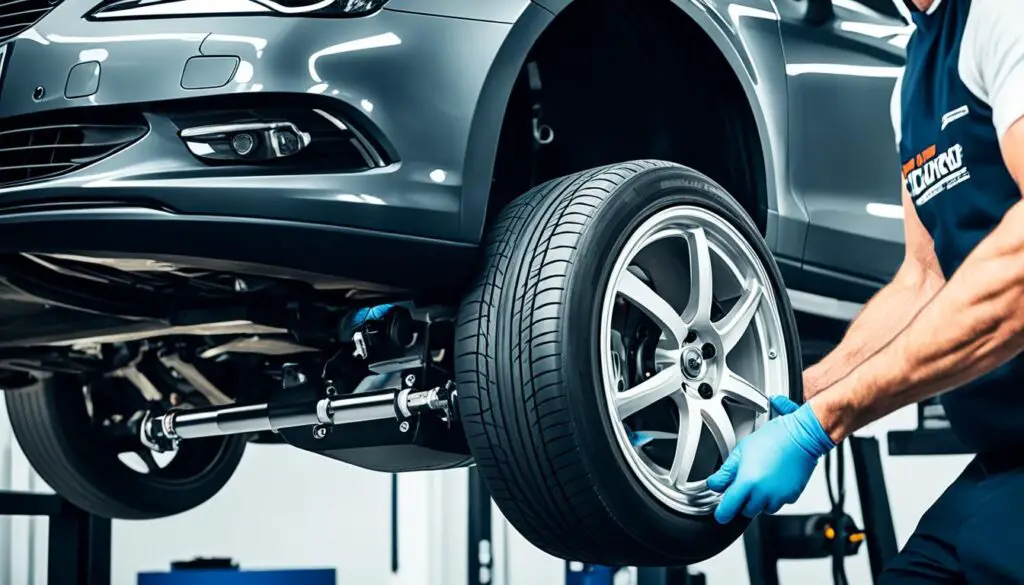
Mastering Car Suspension Tuning for Better Handling
Car suspension tuning plays a crucial role in enhancing a vehicle’s handling and overall performance. By fine-tuning the suspension components and settings, drivers can achieve better control, improved stability, and an enhanced driving experience. In this article, I will explore the key aspects of car suspension tuning and how it can be mastered to optimize handling.
Key Takeaways:
- Car suspension tuning is essential for improving handling and vehicle performance.
- Understanding the various suspension components and settings is crucial for effective tuning.
- Tuning techniques such as optimizing cornering performance and reducing body roll can greatly enhance handling.
- Car suspension tuning provides benefits like enhanced handling, improved control, and increased stability.
- Mastering the art of car suspension tuning can unlock a vehicle’s full potential and enhance the driving experience.
Understanding Suspension Components and Settings
A car’s suspension system consists of several crucial components that work together to provide support, stability, and comfort during driving. These components include dampers, springs, and anti-roll bars. Understanding the role of each component and its impact on the overall suspension performance is essential when it comes to fine-tuning your car’s suspension settings.
The dampers, also known as shock absorbers, play a vital role in controlling the up-and-down movement of your vehicle’s suspension. They work by absorbing the energy from road imperfections, preventing excessive bouncing or jolting. Dampers come in various types, including conventional hydraulic, gas-charged, and electronically controlled. Each type has its own characteristics and adjustability, allowing drivers to customize their suspension according to their preferences and driving conditions.
The springs in a car’s suspension system are responsible for supporting the weight of the vehicle and providing the necessary flexibility to absorb road irregularities. There are two common types of springs: coil springs and leaf springs. Coil springs are the most widely used and offer excellent ride quality and adjustability. Leaf springs, on the other hand, are commonly found in trucks and heavy-duty vehicles, providing high load-carrying capacity and durability.
Anti-roll bars, also known as sway bars or stabilizer bars, are designed to reduce body roll during cornering. They connect the left and right sides of the suspension together, increasing overall stiffness and limiting the body’s tendency to lean excessively. Anti-roll bars come in adjustable options, allowing drivers to fine-tune their suspension for different driving conditions and preferences.
In addition to the components, suspension settings play a crucial role in optimizing your car’s performance. Adjustable damping allows drivers to control the amount of resistance from the dampers, providing a balance between comfort and performance. By adjusting the damping settings, you can fine-tune the suspension’s response to different road surfaces and driving styles.
Another important suspension setting is adjustable ride height. This feature allows drivers to raise or lower the car’s suspension according to their needs. Lowering the ride height can improve aerodynamics and reduce body roll, enhancing overall handling. On the other hand, raising the ride height can provide better ground clearance and improved comfort on rough terrain.
Understanding the function of suspension components and the impact of various settings is crucial for mastering car suspension tuning. By making informed decisions and adjustments to your vehicle’s suspension, you can achieve optimal handling, improved stability, and a more enjoyable driving experience.

Tuning Techniques for Improved Handling
Improving a car’s handling requires employing various tuning techniques that optimize the suspension setup. By fine-tuning specific settings, drivers can enhance cornering performance, maximize traction, reduce body roll, and improve overall control.
Optimizing Cornering Performance
One of the key aspects of tuning suspension is optimizing the setup for cornering. This involves adjusting settings like camber, which refers to the vertical tilt of the wheels. By fine-tuning the camber angle, drivers can maximize tire contact with the road surface, enhancing grip and stability during cornering maneuvers.
Reducing Body Roll
Excessive body roll negatively impacts handling and responsiveness, compromising overall vehicle control. To reduce body roll, drivers can stiffen the suspension by upgrading to performance-oriented springs and installing anti-roll bars. These modifications effectively minimize body roll, allowing for more composed and stable cornering.
Enhancing Traction and Responsiveness
Tuning the suspension to improve traction and responsiveness greatly enhances the overall handling of a vehicle. This can be achieved by adjusting suspension settings such as damping rates and sway bar stiffness. Fine-tuning these parameters optimizes the distribution of forces during cornering, resulting in improved traction, better road grip, and enhanced driver confidence.

By employing these tuning techniques, drivers can unlock the full potential of their vehicle’s suspension and achieve better handling. Whether on the track or everyday driving, mastering the art of suspension tuning significantly enhances the driving experience and provides greater control and confidence behind the wheel.
The Benefits of Car Suspension Tuning
Car suspension tuning provides numerous benefits for drivers. When the suspension of a vehicle is properly tuned, it can greatly enhance the handling, resulting in an exhilarating driving experience. With a tuned suspension, drivers can experience sharper steering response, allowing them to navigate corners with improved control and precision. This not only enhances the overall performance of the vehicle but also increases the driver’s confidence on the road.
Another significant benefit of car suspension tuning is increased stability. By adjusting the suspension components and settings, drivers can reduce the chances of the vehicle experiencing excessive body roll or instability during maneuvers. This provides a more composed and stable ride, especially when navigating uneven terrain or high-speed turns. Increased stability not only improves the driving experience but also enhances safety by minimizing the risk of accidents due to loss of control.
Furthermore, mastering the art of car suspension tuning can unlock the full potential of a vehicle, providing a more enjoyable and dynamic driving experience. By customizing the suspension to suit personal preferences and driving conditions, drivers can optimize the vehicle’s performance. Whether it’s maximizing grip during cornering or improving traction and responsiveness, a well-tuned suspension allows drivers to extract the best performance from their vehicle.
FAQ
What is car suspension tuning?
Car suspension tuning is the process of fine-tuning the suspension components and settings of a vehicle to enhance its handling and overall performance.
What are the main components of a car suspension system?
The main components of a car suspension system include dampers (shock absorbers), springs, and anti-roll bars.
What are adjustable damping and height?
Adjustable damping and height are suspension settings that allow drivers to customize their vehicle’s response to different road conditions and driving preferences.
How can suspension tuning improve cornering performance?
Suspension tuning can improve cornering performance by optimizing settings like camber (the vertical tilt of the wheels) to maximize tire contact with the road and improve grip.
How can body roll be reduced through suspension tuning?
Body roll can be reduced through suspension tuning by stiffening the suspension and installing anti-roll bars.
How does suspension tuning enhance traction and responsiveness?
Suspension tuning enhances traction and responsiveness by adjusting the suspension to provide better grip and control, resulting in improved handling.
What are the benefits of car suspension tuning?
Car suspension tuning provides benefits such as enhanced handling, improved control, and increased stability, resulting in a more enjoyable and dynamic driving experience.
